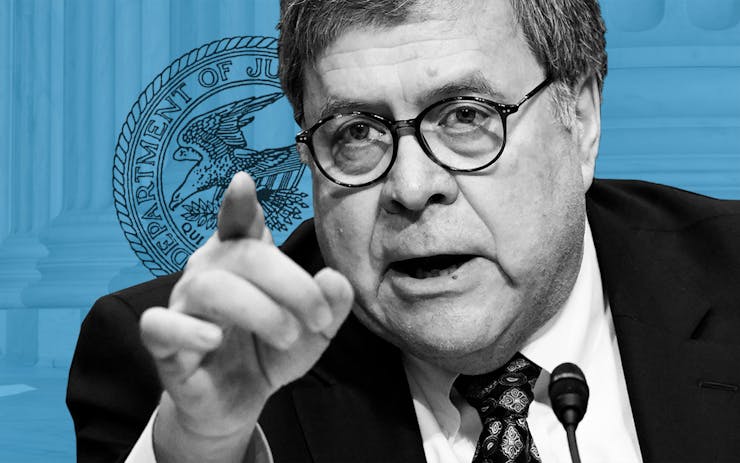In a blockbuster statement released today, a high official within the US Department of Justice accused Attorney General William Barr of ordering antitrust investigations into 10 cannabis companies, based solely on Barr’s political opposition to marijuana legalization.
The antitrust investigations were allegedly motivated by Barr’s opposition to cannabis legalization.
The mergers in question, which included well-known companies such as MedMen and PharmaCann, did not meet the department’s criteria for antitrust investigations, said John W. Elias, former chief of staff within the Justice Department’s Antitrust Division. Elias’ accusations came in written testimony submitted to the House Committee on the Judiciary. The antitrust investigations, said Elias, were motivated by Barr’s personal opposition to cannabis legalization.
“These mergers involve companies with low market shares in a fragmented industry; they do not meet established criteria for antitrust investigations,” wrote Elias.
Elias is expected to testify in person before the House committee tomorrow, June 24.
False antitrust cases were 29% of DOJ’s annual caseload
Barr’s orders carried such weight, Elias added, that the cannabis cases accounted for nearly one-third of DOJ’s antitrust workload in fiscal year 2019.
The charges raise questions about Barr’s potential abuse of authority and waste of departmental resources. “While these were nominally antitrust investigations,” Elias testified, “and used antitrust investigative authorities, they were not bona fide antitrust investigations.”
Charges leveled by nonpartisan official
Elias is no disgruntled partisan. He joined the Justice Department in 2006, under President George W. Bush, and served for 14 years under six attorney generals and three presidents, both Republicans and Democrats. From Jan. 2017 to Oct. 2018, Elias was chief of staff of the DOJ’s antitrust division. He currently works as an antitrust division prosecutor under Barr. His casework includes looking at price-fixing conspiracies in the pharmaceutical industry.
According to his testimony, Elias was so alarmed by Barr’s direction on the cannabis cases that he reported his concern to the Justice Department’s inspector general. Each federal cabinet-level department maintains an inspector general to oversee the legality of the work done within the department. IGs and their staff members function as a kind of internal affairs check on potential abuses within the department.
Over the past weeks and months President Trump has purged many inspectors general because, presumably, he views them as a check on his power and corruption.
“Based on what I have seen, and what my colleagues saw and described to me, I was concerned enough to report certain antitrust investigations launched under Attorney General Barr to the Department of Justice Inspector General,” testified Elias. “I asked him to investigate whether these matters constituted an abuse of authority, a gross waste of funds, and gross mismanagement.”
DOJ messing with MedMen
In his Congressional testimony, Elias explained that the DOJ’s Antitrust Division investigates only 1% to 2% of the thousands of mergers that happen every year. DOJ acts on “only the most concerning deals,” Elias said.
Justice Dept. officials demanded 1.3 million documents from the MedMen — PharmaCann merger. The deal eventually collapsed.
In fiscal year 2018, only 19 large-scale investigations were undertaken. In fiscal year 2019, 31 were opened. More than 2,000 transactions were filed with the Department during each of those years.
In 2019, DOJ staff reviewed a proposed merger of MedMen and PharmaCann, and advised that the deal did not merit a full investigation.
Because the state-regulated cannabis industry is so fragmented by state lines, DOJ staff concluded the transaction “was unlikely to raise any significant competitive concerns that would justify” a further expanded investigation.
At a March 5, 2019, meeting, Elias testified, Barr rejected his staff’s advice and ordered a full-scale investigation into the merger.
“The rationale for doing so,” Elias wrote, “centered not on an antitrust analysis, but because [Barr] did not like the nature of their underlying business.”
Antitrust cases can kill a company
A federal antitrust investigation is an enormous undertaking, both for the Justice Department and the companies involved. Microsoft famously labored under the burden of a DOJ antitrust investigation for much of the 1990s. More recently, the DOJ sued to block AT&T’s planned $85 billion merger with Time Warner. Microsoft survived, as did the AT&T-Time Warner deal, but not after draining the companies of precious time and resources.
Elias did not specify other deals beyond the MedMen merger with PharmaCann. But that investigation offers insight into the onerous burden brought by a DOJ investigation. After opening the MedMen / PharmaCann investigation in early 2019, Justice Department officials demanded and received 1.3 million documents from the files of 40 employees involved in the cannabis deal.
The DOJ investigation closed in Sept. 2019 without any enforcement action, but the investigation effectively blew up the merger. A few months later, MedMen itself imploded.
As Politico’s Ben Schreckinger and Mona Zhang documented in great detail last month, the company has been hit with charges of labor law violations, stock price manipulation, bank fraud, and illegal campaign contributions. In 2018, MedMen stood as the cannabis industry’s high-flying brand leader. Today it’s a shell of its former self, widely viewed as a cautionary tale of wild-west cannabis investment and expansion gone wrong.
The question for Barr: Why?
If true, Elias’ charges lead to a question of motive. Why would Attorney General Barr waste his and the department’s time digging into small-time cannabis mergers?
There are a number of possibilities.
Barr might have ordered the antitrust investigations simply to harass cannabis companies—or to hinder investigations of bigger fish.
One simple answer might be because he can. Publicly, Barr has expressed negligible interest in marijuana and state legalization. During his Senate confirmation hearing, he only lightly touched on the issue, expressing concern that the state-federal conflict over legalization could not stand indefinitely:
“My approach to this would be not to upset settled expectations and the reliance interests that have arisen as a result of the Cole memoranda,” Barr said. “Investments have been made, so I don’t think it’s appropriate to upset those interests.”
In April 2019, Barr told members of Congress that he preferred the STATES Act over federal prohibition.
Messing with cannabis, or slow-walking other investigations
But Elias’ testimony charges Barr with harassing cannabis companies simply out of spite.
Given Barr’s far-right conservative background, though, it’s not a stretch to assume his views on legalization aren’t far from those of his predecessor, the notoriously anti-cannabis Jeff Sessions. Barr might have ordered the antitrust investigations simply to harass cannabis companies. The attorney general’s widely documented bullying tendencies would also be in line with this reasoning.
The investigations might also have been a backhanded way of hindering antitrust investigations that Barr, Trump, and their backers did not want to discourage or quash. By sending nearly one-third of the antitrust department’s resources on a wild goose chase, Barr effectively slow-walked antitrust actions against bigger fish—like, say, pharmaceutical companies.
This is bigger than just cannabis
Reaction from across the political spectrum indicates that Barr’s possible abuse of authority is breaking out of the cannabis world and spilling over into bigger potential trouble for the attorney general.
Norman Ornstein, a longtime Capitol Hill political commentator, had this to say:
The evidence is mounting against the rot in the Barr Justice Department. Antitrust prosecutor John Elias,will testify that Attorney General William Barr personally ordered the Justice Department’s Antitrust Division to launch politically motivated reviews of 10 cannabis mergers.
— Norman Ornstein (@NormOrnstein) June 23, 2020
Former US Attorney and current LA Times legal affairs columnist Harry Litman noted that local legal groups were already raising a hue and cry:
The New York City Bar Association has written to Congressional leaders “in response to continuing actions by Attorney General William P. Barr that raise the most serious questions about Mr. Barr’s fitness for the high office that he holds.”
— Harry Litman (@harrylitman) June 23, 2020
This is a breaking story. Leafly will have more in the coming hours.





